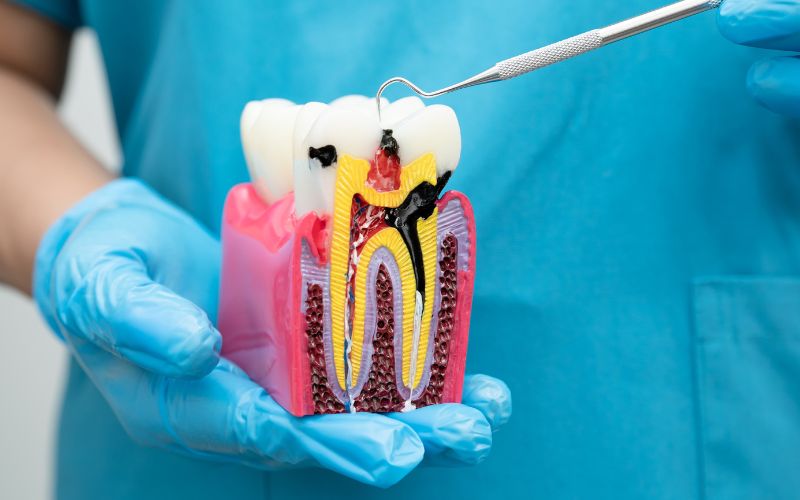1930 E. Rosemeade Pkwy #103 Carrollton, TX 75007


A root canal infection, also known as an endodontic infection, occurs when bacteria invade the innermost part of the tooth, called the pulp. This can lead to significant discomfort and serious health issues if not promptly treated. Understanding the vital signs of a root canal infection is essential for seeking timely treatment and preventing complications. This blog outlines the key symptoms to watch for and explains the importance of addressing them promptly.
What is a Root Canal Infection?
A root canal infection happens when bacteria penetrate the tooth’s pulp chamber, which houses nerves, blood vessels, and connective tissues. The infection can result from deep tooth decay, repeated dental procedures on the tooth, or a crack or chip in the tooth. If left untreated, the infection can spread to the surrounding tissues, leading to severe pain and complications.
Vital Signs of Root Canal Infection
1. Severe Toothache
One of the most common signs of a root canal infection is a severe, persistent toothache. The pain may be constant or come and go, and it can range from a dull ache to a sharp, throbbing sensation. The pain might intensify with pressure or when chewing, indicating inflammation and infection within the tooth.
2. Sensitivity to Hot and Cold
Increased sensitivity to hot and cold temperatures is another indicator of a root canal infection. You may experience sharp pain or discomfort when consuming hot or cold foods and beverages. This sensitivity occurs because the infected pulp is highly reactive to temperature changes.
3. Swelling and Tenderness
Swelling in the gums or face near the affected tooth can signal an infection. The swelling may be accompanied by tenderness when touching the area or biting down. In more severe cases, the swelling can extend to the jaw or neck, indicating that the infection is spreading.
4. Discoloration of the Tooth
A tooth affected by a root canal infection may change color, often becoming darker or grayish. This discoloration occurs because the pulp inside the tooth is dying or has already died, affecting the tooth’s appearance.
5. Bad Breath or Unpleasant Taste
An infected tooth can produce an unpleasant odor or taste in the mouth. This bad breath or taste results from the accumulation of pus and bacteria within the tooth and surrounding tissues. If you notice a persistent bad taste or odor despite maintaining good oral hygiene, it may be a sign of infection.
6. Pus or Abscess Formation
In some cases, an abscess or pus-filled pocket may form at the base of the tooth or along the gum line. This abscess is a localized infection that can cause significant pain and swelling. It is a clear sign that the infection has progressed and requires immediate attention.
7. Difficulty Opening the Mouth
Difficulty opening the mouth fully or experiencing pain while doing so can indicate that the infection has spread to the surrounding tissues. This symptom may be accompanied by swelling and discomfort in the jaw area.
Importance of Seeking Prompt Treatment
Recognizing and addressing the signs of a root canal infection promptly is crucial for several reasons:
- Prevents Spread of Infection: Timely treatment helps prevent the infection from spreading to other teeth or tissues. An untreated infection can lead to more severe health issues, including systemic infections.
- Alleviates Pain and Discomfort: Root canal therapy can relieve the severe pain and discomfort associated with the infection. Early treatment can prevent prolonged suffering and improve your quality of life.
- Preserve Tooth Function: Addressing the infection early can help save the affected tooth, preserve its function, and prevent the need for extraction. Root canal therapy removes the infected pulp and seals the tooth, allowing it to continue functioning properly.
- Prevents Complications: Delaying treatment can lead to complications such as tooth loss, bone loss around the tooth, or the development of a more severe infection. Early intervention minimizes the risk of these complications.
A root canal infection can show various symptoms, such as severe toothache, sensitivity to hot and cold, swelling, discoloration, bad breath, pus formation, and difficulty opening the mouth. Identifying these signs and seeking prompt dental care is crucial for effectively managing the infection and preventing complications. If you experience any of these symptoms, schedule an appointment as soon as possible for root canal therapy. Regular dental check-ups, maintaining a proper oral hygiene routine, and addressing issues early can help prevent infections and keep your smile healthy and functional. If you have concerns about your oral health, don’t hesitate to contact your nearest dentist for personalized advice and care.

